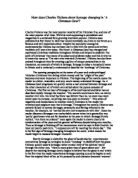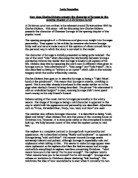The first ghost to visit Scrooge is the Ghost of Christmas Past in Stave 2. This small, elderly figure represents memory. The Ghost shows Scrooge scenes from the past that trace Scrooge's development from a young boy, lonely but with the potential for happiness, to a young man with the first traces of greed that would deny love in his life. Scrooge gains empathy for the neglected when the Ghost reminds Scrooge of his own neglected childhood; inspiring him to want to give to the carol singer he neglected “Nothing. There was a boy singing a Christmas Carol at my door last night. I should like to have given him something: that’s all.”
When the Ghost shows him his sister and remarks that “…. she had a large heart!”, Scrooge feels for her and is uncomfortable when the Spirit reminds him of his nephew. He shows newfound emotion when revisiting these scenes, often crying from identification with his former neglected self.
Scrooge is also shown happy times, as he sees himself apprenticed to the kind and merry merchant Fezzywig. He remarks that Fezzywig had the power to make his apprentices happy or sad and that “the happiness he gives is quite as great as if it cost a fortune.” He feels guilty and is ashamed by his own callous treatment of his clerk Cratchit. “No. I should like to be able to say a word or two to my clerk just now.” Finally, the Ghost shows Scrooge how money has interfered with his potential romance and the joys of family life. All of these scenes expose how money has driven a wedge between Scrooge and others, and his loneliness, which he seems to have repressed for years, is returning in profound new ways.
In Stave 3, Scrooge is awakened by the , a giant with a life span of one day. The spirit displays abundance but is also slowly dying, thus representing the many opportunities (and missed opportunities) to care for others and how big the world is. When the Ghost of Christmas Present introduces himself, Scrooge declares that he is willing to accompany him because he wants to learn. “…. I went forth last night on compulsion, and I learnt a lesson which is working now. To-night, if you have aught to teach me, let me profit by it.”
When shown the present, he is overcome by pity for a few moments about Tiny Tim and Cratchit's wretched household, and in awe at the people he sees that are happy even though they are poor. He begins to pity himself a little more because he sees how happy others are. He is beginning to repent, especially when he asks if Tim will live. “Spirit,” said Scrooge, with an interest he had never felt before, “tell me if Tiny Tim will live.” Having witnessed the family Christmas celebration, Scrooge realises that he does not have the right to choose who lives or dies and is overcome with remorse and sorrow when he hears his own words quoted by the Spirit. “… If he be like to die, he had better do it, and decrease the surplus population.”
When he is shown Ignorance and Want, he begins to realize how harsh he has been and is already beginning to change his thinking. For the first time, he cares enough to ask if there is anyone to look after them “Have they no refuge or resource?” but the Spirit reminds him of his own words about prisons and workhouses. He also shows sympathy for the spirit as it dies.
In this Stave, Scrooge learns that it is never too late to love. The Ghost’s brief life span of one day also reminds Scrooge that he must act quickly if he is to change the present. Before, Scrooge was concerned with the present day related to money making business, now he is starting to see the urgency of seizing an opportunity to change the lives of the less fortunate.
The Ghost of Christmas Yet to Come is terrifying, dark and silent. He symbolises our fear of the future and what we make of it, that is why the face of the spirit is invisible and he is cloaked in black. In Stave 4, Scrooge is eager to learn and wants to change “… but as I know your purpose is to do me good, and as I hope to live to be another man from what I was…..”
The Spirit shows Scrooge that the memory of Tiny Tim will live on and remind his family of the good in the world. By now, Scrooge has undergone his final transformation and feels duly sad that the only joy his life will provide for others after it is over is through their acquisition of his material goods or release from debt, not through his memory. Scrooge promises to change his attitude to Christmas and to show goodwill all year round. “I will honour Christmas in my heart, and try to keep it all the year…”
He finally understands that the future he is shown is alterable and that he can change his fate “Good Spirit…Your nature intercedes for me, and pities me. Assure me that I yet may change these shadows you have shown me, by an altered life.”
In Stave 5 Scrooge actually makes due on his transformation by repenting and redeeming himself by his actions. He sends a turkey to the Cratchits. This in itself would not be redemption if he didn't follow through in other ways- he pays the boy, he pays for the cab, and he delights in thinking that they will not know who it is from. He is not trying to just save himself (he would have put his name on the turkey if he was), he really wants to make a difference. He treats Cratchit kindly, and visits his nephew. In fact he becomes a good man to all of the people he has let down, and in his actions and change of heart he is redeemed.
As a result of his transformation, Scrooge becomes a better master to Cratchit, a second father to Tim and a real member of the family to Fred.
A Christmas Carol has become one of his most popular works, not least because it has been produced several times as a film or on television and, in most years, it is dramatised in theatres around the country at Christmas as a children’s production to rival the standard Christmas Pantomimes. The novel does raise the kinds of social issues in many of Dickens’ other works, but without the sharp critical edge and with a great deal more lightness and sentimentality, hence it is not generally given the serious critical analysis which many of his other works are afforded. ‘A Christmas Carol’ may not be one of Dickens’ more serious or socially challenging novels, but through the transformation of his central character, the author is able to prompt in readers the same kind of reflection on Victorian society as he does in some of his other work.







